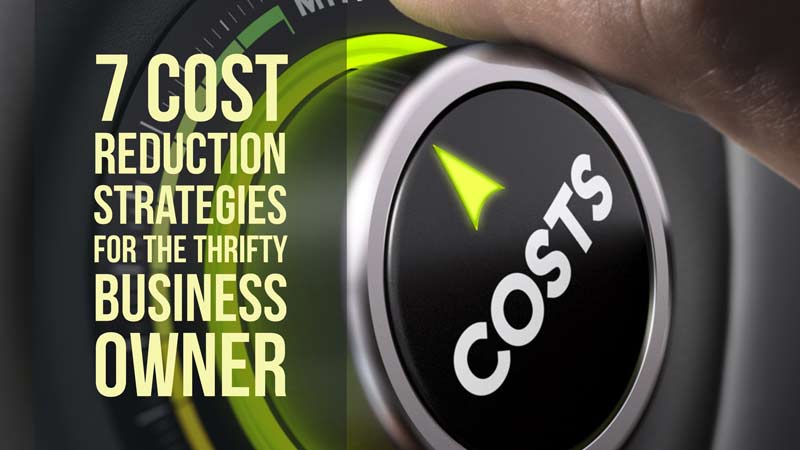 You are not alone if you’re looking for business expense cost reduction strategies. Any business that’s been at it for more than a year is sure to have areas that are ripe for cost-saving strategies. As your business grows, so do the needs and demands of the business. It’s difficult to hit the bulls-eye every time as the pace of change escalates around you.
You are not alone if you’re looking for business expense cost reduction strategies. Any business that’s been at it for more than a year is sure to have areas that are ripe for cost-saving strategies. As your business grows, so do the needs and demands of the business. It’s difficult to hit the bulls-eye every time as the pace of change escalates around you.
Table of Contents
ToggleTop 7 Cost Reduction Strategies
There are 7 main areas that are pretty easy to analyze, and then put some cost reduction strategies in place. Let’s take a look these cost reduction strategies and see where your business can start saving money.

Strategy #1 – Evaluate Your Space Need
The location of your business is likely one of the biggest expenses on your book and one of the biggest operational cost reduction strategies. Have you evaluated your lease or building costs lately? Take some time to ask yourself if you still need the amount of space in your current arrangement. Is there a portion of your space that you could sub-lease to recover a little of your monthly expenses? What about space for staff? Do you have staff members that are no longer with your organization thus freeing up space in your building? How could you re-purpose that space?
Most businesses will sign a lease and then feel tied down by the terms of that contract. Remember, your landlord wants to get paid and is likely to work with you to keep you as a tenant. Consider re-negotiating your building arrangement to cut costs. Most building owners are more than willing to work with great tenants to keep them around.

Strategy #2 – Review Telecom Fees and Use
When is the last time you did an evaluation of what you are paying for telecom services?
“On average, about 50 percent of telecom bills have an error that accounts for 3 to 5 percent of the total value of the overall telecom spend.” This statement alone should encourage each one of us to take an immediate review of our telecom costs. A common error in any size company is to have an employee leave the business and never turn off their plan. This unnecessary expense continues to add to the telecom spend while delivering no value to the business.
For many companies, the way to save money on telecom is to spend money on telecom. Updating old equipment and taking advantage of new contracts can save considerable money for a business in the long run. In an era of VOIP service, many telecom bills have plummeted with the advent of new technology. You’re most likely paying much more than you need to be if you’re still paying for an outdated phone contract. Clean up your telecom costs with a free audit offered by many of the major players in the telecom space.

Strategy #3 – Do a Vehicle Fleet Cost Assessment
Maintaining any type of vehicle fleet is costly, but how long has it been since you’ve calculated exactly how much? When you add together the costs for fuel, maintenance, tires, washes and more, things can add up fast. Consider doing a vehicle audit to see how much each vehicle is costing you per year. Would there be a big enough savings if you changed out the type of vehicle for something more cost effective? Could you double your vehicle use by adding a wrap to each to increase your local exposure?
One way to save money on your corporate vehicle costs is to not pay too much for the vehicle’s purchase. There are plenty of ways to find a great vehicle in great working condition. Is there a local business that’s closing up shop and needs to sell off their fleet? There are usually a couple of auction specialists at large automotive dealerships that can help you shop local dealer-only options. They can help you scoop up a vehicle for your fleet at a fraction of the price if you let them know what you’re in the market for.
Great cost reduction strategies will be sure to ask if you’ve taken an assessment of how many miles you’re driving in company vehicles. If you’re going to be looking at tens of thousands of miles each year, a diesel or hybrid may be the way to go. You will pay more up front, but you will save thousands each year as the miles rack up.

Strategy #4 – Assess Printing Costs
Printing costs can vary as much as 50% between vendors, so have you done a pricing comparison lately? If you’ve been doing your printing with the same company for years, do you know if they are continuing to give you great prices? Whether it’s stationery for the front office or a brochure to hand out to clients, it all costs money. The difference in price for a box of business cards can differ from $15 – $80 for just 500 cards. If you’re not shopping around, you may have found a printer who is more than happy to take the extra money you’re giving them.
With all the advancements in technology in the printing space, savings are available to your business. As new printers become available to the printing companies in your locale, are you getting the savings that come along with them? If you’ve only looked for pricing in your town, have you priced across the internet? There are many printing companies where you can upload a current design or layout and get it printed with the same quality for much less. Before you hit that “reorder” button, make sure the price your printer is giving you is fair in the industry.

Strategy #5 – How Much Are You Paying For Credit Card Processing?
One of the most effective cost reduction strategies available to your business can be Payment Processing Merchant services. With many businesses paying between 3-6% in credit card fees, the bottom line seems to erode quickly with fees paid to processing companies. Have you looked at what options are available for your company? If you’re in an industry that accepts credit cards at the point of sale, have you considered offering a cash discount program? By implementing a cash discount program at the point of sale, you in effect give a discount for cash paying customers while adding a convenience fee for others who choose to pay with a credit card. With this new strategy, you can reduce your credit card fees to zero with zero fee processing. Imagine the savings to your bottom line if you could eliminate any credit card fees for your organization.
If you’re currently locked into a contract with your processing company, do an evaluation of your rates. If the rates you’re paying for processing don’t match the rates you were quoted when signing up, it’s time to pay the exit clause and find a better company. Oftentimes paying the exit clause and moving to a more reputable company will save you much more money even in the short term.

Strategy #6 – What’s Your Utility Usage?
Paying a premium for energy use at peak times can add up quickly. Most cost reduction strategies evaluate your energy consumption, but change involves a company-wide effort. Some simple ways to reduce costs are to replace all of your light bulbs in the building with CFL or LED bulbs. Consider an energy audit from your local utility company. Most utility companies will offer a free energy audit if you simply call and ask. With a simple phone call, your business can be on the way to saving money by eliminating unnecessary costs.
Consider having all of the computers in the office set to hibernate shortly after business hours end. By using the hibernate feature of all computers in the office, you save all of the work that was done and save energy at the same time. On weekends and holidays, turn everything off. If there’s not going to be anyone in the office for a day or two, turn off everything. There’s no use keeping printers, computers and other electronics powered on if nobody is going to be around to use them.

Strategy #7 – Assess Your Marketing Return On Investment
When was the last time you did an audit of your marketing efforts? The marketing landscape changes dramatically about every 6 months. If you’re not staying on top of what’s working, you may be putting money into marketing channels that simply don’t work anymore. Schedule a strategy and consulting call with a digital marketing company to do an evaluation of what’s working, what’s not and where you could reinvest money from broken channels.
Cost Reduction Strategies: Conclusion
There is no master list of cost reduction strategies for business. You have to decide how much effort you want to put into finding and eliminating the waste to save your hard-earned money. The areas and strategies above are a great start, and with minimal effort, you can find areas that are ripe for improvement.










